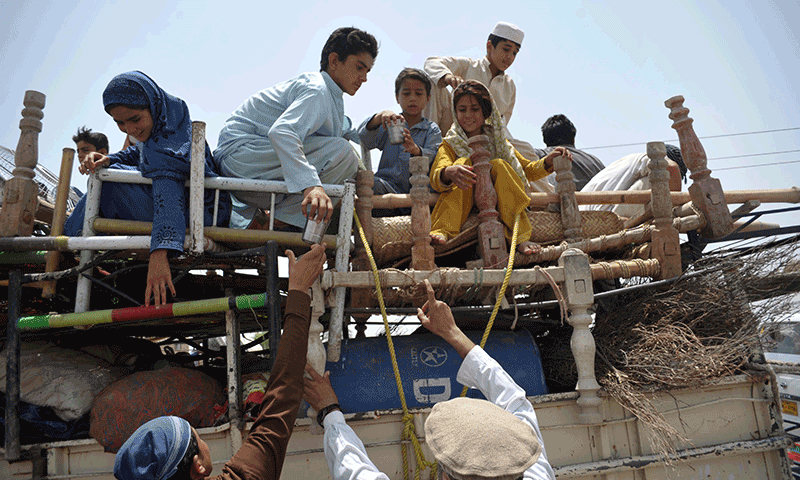- info@glopri.com
- Mon - Sat 8:00 - 18:00. Sunday CLOSE

Disasters, both natural and man-made, have been one of the major causes of mass displacements around the world. It is astonishing to note that the number of internally displaced persons (IDPs) has incredibly increased in the past decade, reaching over 71 million overall in 2022. Pakistan is not an exception. The country saw a huge mass displacement in the last two decades, partly due to the devastating floods, and earthquakes and partly due to the rising tide of militancy in former Federally Administered Tribal Areas (FATA) and the picturesque Swat valley in the North West of Pakistan.
The militancy that took over 80,000 precious lives forced millions more to be displaced. Besides, material damages have gone over 150 billion dollars. An estimated 8 million were displaced in the recent 2022 flooding. Some 2.5 million were displaced in Swat Valley in 2009. Earlier, a huge number of people got displaced from FATA in the wake of the rising tide of militancy and the subsequent military operations. But surprisingly, many of the IDPs are still waiting to be relocated and rehabilitated.
The years-long out-of-home stay has been multiplying the miseries of the TDPs manifold with its effects seen majorly in the fields of education, health, and security. Schools were blown up, health facilities destroyed, road networks damaged, and agriculture and communication infrastructure was damaged and destroyed. The TDPs had to lose their jobs, and businesses back home. And after all, they had to go through a psychological trauma all this while.
During this time they were deprived of their basic necessities of life such as access to electricity and drinking water facilities. Most of the time they live together either in tents/makeshift camps, host families, or rented houses in overcrowded and unhygienic conditions that make them prone to a variety of infectious diseases. Amongst them, kids are the worst sufferers who suffer, most often, from malnutrition with the highest mortality rates. They are prone to violence including abductions and sexual assaults. Women could also be seen humiliated at the TDP camps by joining long queues to get a pack of sugar/flour or other edible commodities. And the jobless men, setting idols in tents, have developed a variety of psychological problems.
There is no denying the fact that Pakistan suffered a lot in the ongoing global war on terror, both in terms of men and materials. However; this huge mass displacement proved to be a blessing in disguise that provided the people a chance to make opportunities out of challenges.
The mass displacement provided them an opportunity to come out of this black hole and see the world with a different eye. They had the opportunity to get their kids admitted into the country's prestigious institutions to see them talk and walk sensibly. They explored new avenues, came in contact with people from across the country to experience new cultures, enjoy the different tastes of life, and gain new experiences to bring back home. This displacement provided them an opportunity to establish businesses and invest in new innovative areas in the big cities of the country – Islamabad, Karachi, Lahore, and Peshawar. Now they could be seen owning business umpires in the capital cities of the country. Many of them had the opportunity to go abroad. These developments naturally provided them an opportunity to interact with people of different ethnicities and diverse backgrounds, promoting cultural tolerance and making new social relations with many around them.
Once they got out of the black hole and saw people enjoying all their rights as a respectable citizen of the country, they started running campaigns for their rights back home. A number of rights-based organizations came into being uniting the people of the once unruly region under different platforms to demand their rights. Students, youth, and women forums were seen in the front row during their struggle. To achieve this larger objective, they put aside their previous tribal frictions, and years-long feuds over traditional issues and disputes, and cooperated with each other for the greater cause. It was only due to the mass awareness that they made the government come to their terms. It was here they first got a reform package in 2010/11 and then this rigorous campaign ended up merging the FATA with the Khyber Pakhtunkhwa to allow them to have equal rights enjoyed by any citizen in the rest parts of the country.
Despite all this, the nature of the issue demands urgent action on the part of the government. In the first place, those still living out of their homes, need to be relocated back to their homes on an urgent basis. Secondly, they should duly be compensated for the damages done to their assets to enable them get rehabilitated and re-integrated back into the society. Third, the national action plan be implemented in its true spirit to avoid space for the militants to re-emerge. And last, as part of the national strategy, the government should devise a fully pledged developmental strategy for the underdeveloped former FATA in collaboration with national and international donors to bring it to par with the rest parts of the country and address the sense of frustrations and deprivation of the people they have developed over the years. To that end, the donor countries should also play their role.